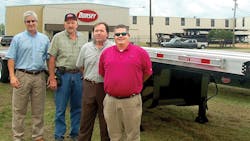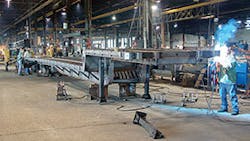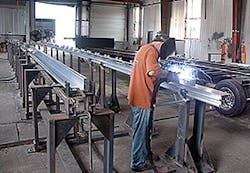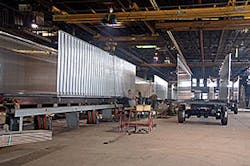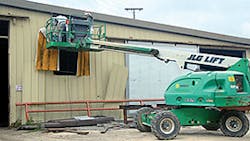Dorsey Trailer adds combo flatbeds to its specialty trailer line
WHEN Jeff Pitts acquired the assets of Dorsey Trailers a few years ago, he had the same types of decisions a card player must make—knowing what to throw away and knowing what to keep.
With the benefit of time, he has fine-tuned his product lineup, discarding and adding trailer models in order to deal himself a pretty good hand.
So what should you discard, and what do you hope to get when adding new cards? At Pitts Trailers, the guiding principle has been to pursue niches. This is what the company has done with the platform trailer business as well as it van trailer line. Keep what you can do well, eliminate what is not a good fit, and add the things that strengthen the product lineup.
Dorsey Trailer specializes in specialty trailers—particularly platforms, heavy-haulers, and extendable trailers. That even includes dry-freight vans—a product normally associated with high-volume production.
Most recently, the company has added depth to its platform lineup by introducing two new drop-
deck models—one of steel, the other an aluminum and steel combination.
Capable of hauling 60,000 pounds in loaded over a 10-ft span, the company’s new steel drop-deck weighs in at just under 12,000 pounds. Available in 48-ft or 53-ft lengths, the
fabricated main beams are made of high-tensile steel. The one-piece web is cut from ¼-inch steel plate with a tensile strength of 80,000 pounds. The flanges are made from Grade 130 high-tensile steel. Both upper and lower flanges are five inches wide, but the lower flange is a full half-inch thick (compared to the 3/8-inch upper flange) to accommodate the extra load placed on the lower flange. Cross members are 4” steel I-beams mounted on 12” centers.
The combo trailer is similar to the company’s steel drop-deck, but the extensive use of aluminum can reduce tare weight by roughly 1,000 pounds compared with its all-steel
counterpart. Aluminum components include the extruded side rails with integrated “LL” and J-hook track, 3/8” x 3” rub rails that provide a recessed surface to protect the conspicuity tape, stake pockets, and extruded aluminum floor that includes four nailer strips. The company also offers aluminum crossmembers as an option.
The two new models join a diverse line of specialty
trailers that include steel flatbeds, drop-decks, double-drops, extendable drop and flatbed trailers, heavy haulers.
Making room
Dorsey Trailer is producing its new steel and combo drop-deck trailers in an area of the plant where Dorsey used to produce refrigerated vans.
To build the new combos, Dorsey assembles the steel components just as the company does its all-steel models—including sandblasting and paint. They then are moved to the newly created production space where the aluminum components are bolted on.
Converting van production space into platform manufacturing is consistent with the way the company has approached the market.
“Before we bought Dorsey, the product mix was about 90% vans and 10% flatbeds,” Jeff Pitts says. “Now that ratio has been flipped.”
Pitts Enterprises, the parent company of Dorsey Trailers, has been finding niches in specialty manufacturing for years. The same is true for vans. The company does not pursue large orders for van trailers, instead producing a variety of high-spec dry-freight vans. They include trailers for transporting electronic products, single- and double-drop vans, chip trailers, and walking-floor vans.”
Back in action
Pitts Enterprises acquired the assets of Dorsey Trailer, including Dorsey’s 800,000-sq-ft plant in Elba, Alabama, in 2007. With the acquisition, Pitts Enterprises owns and operates three trailer divisions: Pitts Trailers in Pittsview, Alabama; Dynaweld Trailers, the Heavy Haul Division of Dorsey Trailer in Elba, Alabama.
Pitts Trailers produces forestry–related trailers, while Dynaweld specializes in heavy haul and tag-along trailers. Dorsey Trailer will continue to manufacture a variety of over-the-road trailers bearing the Dorsey nameplate including dry freight vans, chip haul trailers, and steel and combo flatbeds.
Pitts acquired the Dorsey assets just in time for the most severe trailer industry downturn in a generation.
“The upside of that downturn was that it gave us a chance to get our house in order,” Pitts says. “We are really optimistic about where we are as a company now.”
Dorsey Trailer began truck trailer production in the 1920s. In the 1980s, the firm employed 1,200 people on three shifts and produced 50 trailers per day. Since Jeff Pitts took over, the company gradually has been growing the Dorsey brand—one niche at a time. ♦
__________________
Click here to view larger photos and captions
for Dorsey Trailer
About the Author
Bruce Sauer
Editor
Bruce Sauer has been writing about the truck trailer, truck body and truck equipment industries since joining Trailer/Body Builders as an associate editor in 1974. During his career at Trailer/Body Builders, he has served as the magazine's managing editor and executive editor before being named editor of the magazine in 1999. He holds a Bachelor of Journalism degree from the University of Texas at Austin.
